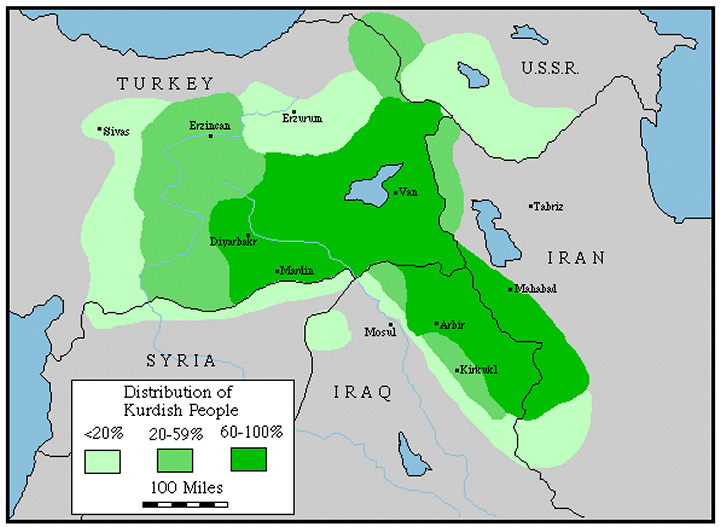 With Turkey on the brink of attacking Iraqi Kurdistan, one of the potentially great faultlines of the 21st century could be opened. There are 25 to 40 million people that call themselves Kurds. Their misfortune is to be scattered over rugged terrain in some of the most important countries of the Middle East. A Kurdish proverb says 'the Kurds have no friends but the mountains'. This is particularly true today when there is little enthusiasm in the wider world to support the merits of a separate Kurdish nation. The Kurdish nationalist party PKK is declared a terrorist organisation in the US, Europe and Australia.
With Turkey on the brink of attacking Iraqi Kurdistan, one of the potentially great faultlines of the 21st century could be opened. There are 25 to 40 million people that call themselves Kurds. Their misfortune is to be scattered over rugged terrain in some of the most important countries of the Middle East. A Kurdish proverb says 'the Kurds have no friends but the mountains'. This is particularly true today when there is little enthusiasm in the wider world to support the merits of a separate Kurdish nation. The Kurdish nationalist party PKK is declared a terrorist organisation in the US, Europe and Australia.
While Kurds have some autonomy within Iraq, they remain a disadvantaged minority group in Iran, Syria, Armenia and Turkey. Although Iranian troops invaded Iraqi Kurdistan last year, it is the Turks who feel most vulnerable to the Kurdish threat. Turkey does not recognise its Kurdish minority and simply calls them “Mountain Turks”. Turkish Prime Minister Recep Tayyip Erdogan is now seeking approval from his parliament to launch an “incursion” into Iraq any time in the next 12 months.
This is no idle threat. In May, Erdogan called for an invasion of Iraq to seek out Kurdish militants and take what the Turkish foreign ministry calls “urgent and resolute measures”. It was in response to a suicide bombing in Ankara which killed six people and injured more than 100. The Turks identified Guven Akkus from Turkish Kurdistan as the culprit and said his methods were similar to those of Kurdish militants. The PKK have copped much of the blame even though there is no link between it and Akkus and it denied responsibility. One Turkish commentator described Akkus as a “Communist”.
While Turkey may be looking for an excuse to punish Kurdish militia, locals have promised a tough reception if they invade. A Kurdish rebel commander told AP on Saturday Turkey would face a long and bloody conflict if it launched an attack. Murat Karayilan, head of the armed wing of the PKK, said an invasion would "make Turkey experience a Vietnam war." "Iraq's Kurds will not support the Turkish army," he said. "If Turkey starts its attack, we will swing the Turkish public opinion by political, civil and military struggle."
The PKK was founded in 1973 and gets its initials from its Kurdish name, Partiya Karkeren Kurdistan (Kurdistan Workers Party). They first launched an armed independence campaign in Turkey’s southeast almost 25 years ago. More than 37,000 people have died in the ongoing violence with deaths spread evenly between the two sides. Turkey launched a major military crackdown in 1999 and captured PKK leader Abdullah Ocalan causing 5,000 fighters to flee to Iraq. The PKK is not entirely welcome in Iraqi Kurdistan. There are already two Kurdish factions in Iraq which exist in an uneasy power-sharing relationship. The PKK operates as a Pan-Kurdish organisation that rejects Iraqi Kurdish efforts to remain within Iraq.
The 25 million Kurds are not necessarily politically united. They are spread across eastern Turkey, northern Iraq, western Iran, and parts of Syria and Armenia. 12 million live in Turkey. The 1920 Treaty of Sevres which fixed Turkey’s border after World War I included the “possibility” of a Kurdish state but Turkish leader Kemal Ataturk rejected it three years later. From the 1980s, the PKK spearheaded a bitter armed resistance in Turkey's Kurdish southeastern provinces.
The PKK gained momentum in the 1990s with the rise of charismatic leader Abdullah Ocalan. But while his supporters call him "Apo" (Kurdish for "uncle"), the Turkish state calls him "child murderer" and "terrorist". Ocalan studied political science at Ankara university where he set up the PKK with fellow students. He left Turkey before the September 1980 military coup and remained in exile until 1999. He was controversially captured in Kenya, with the suspected help of Israel’s intelligence service Mossad. Turkey triumphantly paraded their prisoner in blindfold for the world’s media.
Since 1999, Ocalan has been held in solitary confinement as the only prisoner on Imrali Island in the Sea of Marmara, guarded by a thousand Turkish military personnel. He was found guilty of treason and sentenced to death. The sentence was commuted to life imprisonment in 2001. Ocalan appealed to the European Court of Human Rights. Turkey, mindful of the impact to its possible EU membership, agreed to await the court’s judgment. In 2005 the European Court of Human Rights decided Ocalan’s trial was unfair. However Turkey dismissed a retrial request last year.
While Ocalan festers on Imrali, his homeland is about to take a greater role on the world stage. Turkey has used the US congress stand on the Armenian genocide as an excuse to ignore calls for caution in Kurdistan. Now the price of oil has surged to a new record high of $84 a barrel as the crisis threatens some of the nearby oilfields. Analysts are worried that if Turkey attacks Iraq, the PKK will target the Iraq to Ceyhan oil pipeline and the Baku-Ceyhan pipeline. The “Mountain Turks” will soon find out how many friends they have.
No comments:
Post a Comment